A substantial number of homeowners aspire to enhance their outdoor spaces with a vibrant touch of greenery, particularly through the addition of pergolas. In our previous discussions, we explored the best flowering plants that complement pergolas; however, this article will take you on an exciting journey into the realm of cultivating delectable fruits! By incorporating fruiting vines into your pergola design, you not only create an inviting shaded outdoor area that is perfect for relaxation and social gatherings, but you also have the opportunity to enjoy the delightful experience of fresh, homegrown fruit. In the subtropical climate of Brisbane, a plethora of fruiting vines flourish, offering not only delicious harvests but also enhancing your backyard with beautiful natural greenery and refreshing shade, ultimately transforming it into an idyllic oasis.
It is essential to understand that not every fruiting vine is ideal for pergolas. Some varieties, such as kiwi vines, necessitate a robust structure to adequately support their heavy growth patterns, while others, like passionfruit, grow rapidly and require regular pruning to maintain their shape and overall health. Selecting the right vine for your pergola is crucial to ensuring both aesthetic appeal and fruitful yield.
Below is a comprehensive guide that details the top fruiting vines particularly suited for pergolas in Brisbane, complete with their growing requirements and essential tips to guarantee that healthy, productive plants thrive in your garden. Understanding these factors will empower you to create a fruitful and visually appealing outdoor space.
1. Passionfruit (Passiflora edulis) – The Ultimate Choice for Pergola Coverage
Best for: Brisbane gardens, rapid growth, delightful fruit production, and fostering pollinator-friendly habitats.
Passionfruit is an exceptional selection for draping over a pergola, as it produces lush green foliage, striking purple and white flowers, and sweet, tropical fruit that tantalises the palate. This fast-growing tendril climber can cover a pergola in just a single growing season, providing an immediate enhancement to your outdoor space and creating a vibrant atmosphere. Not only does it add aesthetic beauty, but it also offers a practical food source, allowing you to enjoy the delightful taste of homegrown passionfruit.
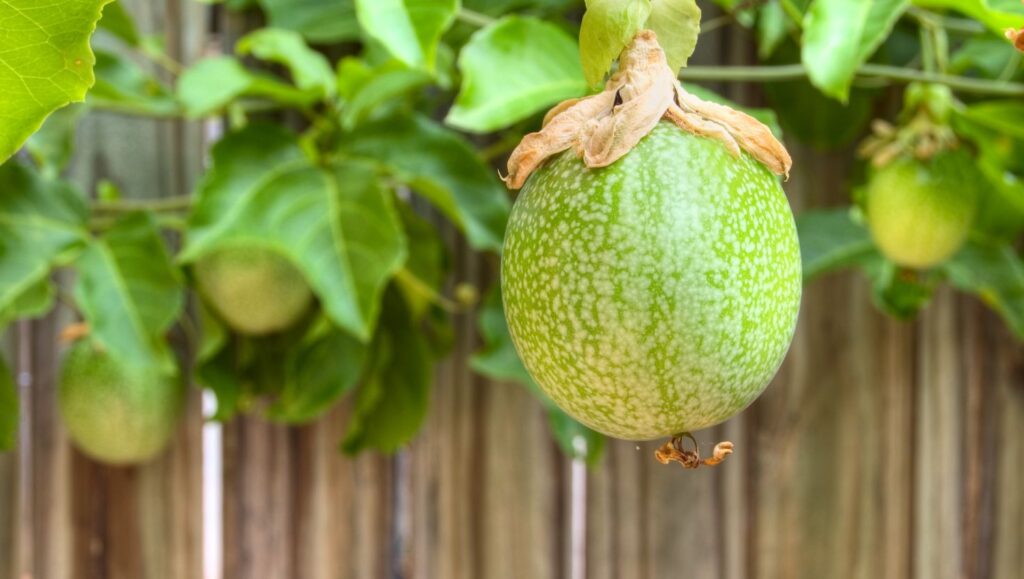
Essential Growing Conditions for Passionfruit to Flourish
- Sunlight: Requires full sun exposure, meaning at least 6 hours of direct sunlight daily for optimal growth, ensuring that the plant receives the energy needed for vigorous development.
- Soil: Prefers well-drained, slightly acidic soil with a pH level between 6.5–7.5, enriched with organic matter for the best results, promoting healthy root development.
- Watering: Needs deep watering 2–3 times weekly, particularly during dry spells, to keep the soil consistently moist and support healthy growth.
- Fertilizing: A high-potassium fertiliser is recommended every 4–6 weeks throughout the growing season to boost productivity, ensuring that the plant has the necessary nutrients for fruiting.
- Pruning: Regular pruning after fruiting is essential to promote fresh growth and prevent excessive overgrowth, maintaining the plant’s health and vigour.
Top Passionfruit Varieties Perfect for Brisbane Gardens
- Nellie Kelly (Grafted Purple Passionfruit) – Renowned for its robust disease resistance and impressive productivity, making it a favourite among gardeners.
- Panama Red & Panama Gold – Produces larger fruit, is heat-tolerant, and thrives in subtropical conditions, ideal for the Brisbane climate.
- Sweet Granadilla (Passiflora ligularis) – Offers aromatic fruit but prefers slightly cooler temperatures for optimal growth, adding diversity to your garden.
Pro Tips for Successfully Cultivating Passionfruit on a Pergola
- Train young vines along the pergola beams to encourage uniform growth and coverage across the structure, enhancing the visual appeal.
- Regularly prune excess growth to enhance airflow and sunlight penetration, which is vital for healthy vines and prevents diseases.
- Plant near a fence or trellis to provide additional support, ensuring the vines have adequate structure to climb, promoting vigorous growth.
2. Kiwi Fruit (Actinidia deliciosa) – A Strong Climber Requiring Sturdy Support
Best for: Large, robust pergolas that can withstand the weight of heavy growth.
Kiwi vines are recognised for being vigorous and heavy growers, thus necessitating a very sturdy pergola to support their weight adequately. As deciduous plants, they shed their leaves in winter, allowing sunlight to filter through when shade is less essential. This unique characteristic makes them a great choice for those who wish to enjoy year-round gardening, as they provide shelter in the warm months and light during cooler seasons.
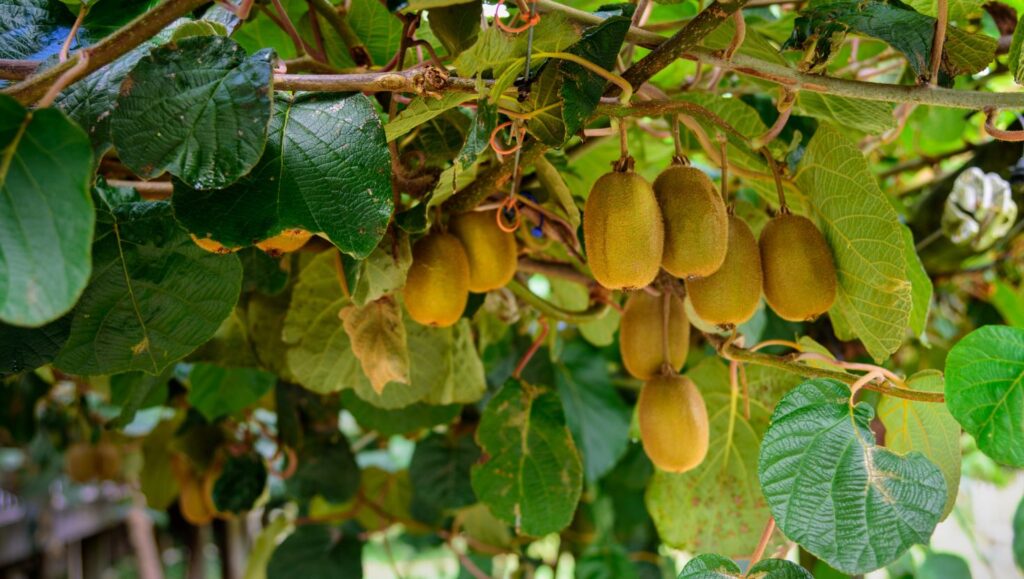
Key Growing Conditions for Optimal Kiwi Fruit Production
- Sunlight: Thrives in full sun exposure, ensuring it receives adequate light for healthy growth, which is essential for fruiting.
- Soil: Requires well-drained, fertile soil enriched with compost to support vigorous growth and robust fruit production.
- Watering: Needs regular watering, particularly during dry spells, to prevent stress on the plant and encourage healthy development.
- Fertilizing: Application of organic compost and slow-release fertiliser in spring will nourish the plant, enhancing growth and fruit yield.
- Pruning: Regular pruning is essential to manage growth effectively and enhance fruit yield, ensuring a productive harvest.
Understanding Kiwi Pollination Needs for Successful Fruiting
Kiwi vines are dioecious, meaning they possess distinct male and female plants. To ensure fruitful pollination and successful fruiting, it is necessary to have at least one male plant for every 4–5 female plants, promoting optimal pollination rates and enhancing fruit production.
Best Kiwi Varieties for Brisbane's Climate and Conditions
- Hayward Kiwi – The most popular variety, needing a male pollinator for fruit production to occur, ensuring a good yield.
- Bruno Kiwi – Recognised for its early fruiting and vigorous growth, making it a favourite among local gardeners.
- Issai Kiwi – A self-pollinating variety, ideal for smaller gardens with space limitations, allowing for versatility in planting.
Effective Strategies for Growing Kiwi Fruits on a Pergola
- Install strong wooden or steel support beams to accommodate the vine’s weight, ensuring safety and stability as the plant matures.
- Space vines at least 3–4 meters apart to allow for adequate spread and airflow between plants, preventing overcrowding.
- Regular pruning is necessary to manage excessive growth effectively, keeping vines healthy and productive while also maintaining their shape.
3. Grapes (Vitis vinifera) – Infuse a Mediterranean Vibe into Your Pergola
Best for: Traditional garden pergolas that provide shaded outdoor dining and relaxation experiences.
Grapes make for a fantastic option for pergolas, offering dense shade during the hot summer months, while allowing sunlight to filter through in winter when they lose their leaves. They require seasonal pruning but are generally considered low-maintenance once established, making them an attractive choice for many gardeners. Their ability to create a beautiful, shaded area while producing delicious fruit makes them a popular selection.
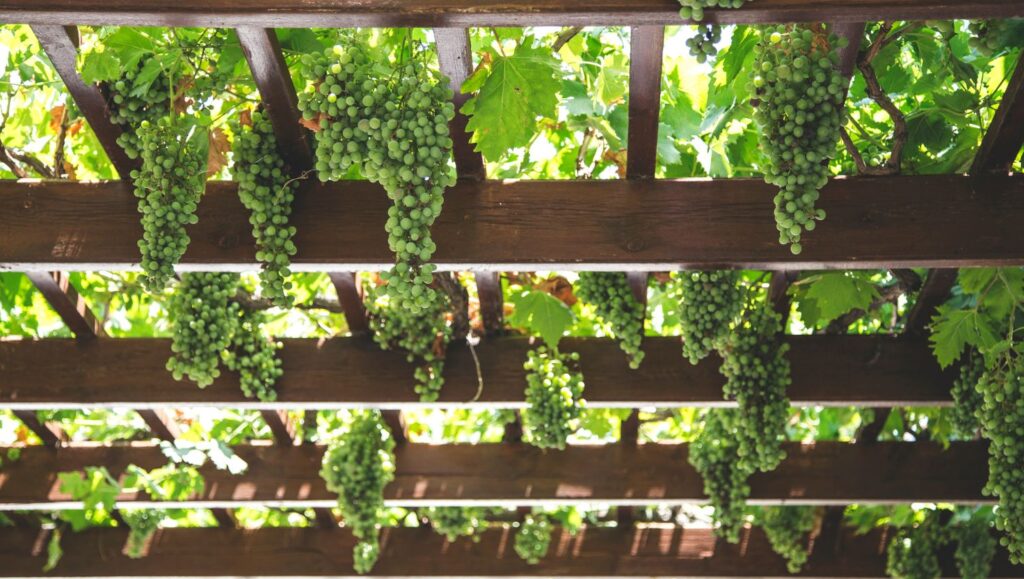
Optimal Growing Conditions for Thriving Grape Vines
- Sunlight: Requires full sun, ideally a minimum of 6 hours of sunlight daily for healthy growth, which is vital for fruit production.
- Soil: Prefers well-drained sandy or loamy soil that supports root health and encourages vigorous growth.
- Watering: Needs deep watering weekly during dry periods to maintain moisture levels, ensuring the plants remain hydrated.
- Fertilizing: Application of organic mulch and balanced fertiliser in spring is beneficial, enriching the soil for optimal growth.
- Pruning: Essential for removing excess wood and promoting fruit production, keeping vines healthy and enhancing yield.
Best Grape Varieties for Gardens in Brisbane
- Flame Seedless – Known for its sweet red grapes, perfect for fresh consumption and snacking, making them a favourite among families.
- Sultana (Thompson Seedless) – Ideal for fresh eating or drying, providing versatility in culinary uses.
- Black Muscat – Produces large, juicy fruit with a rich flavour, great for dessert wines and adding character to your garden.
Expert Tips for Successfully Cultivating Grapes on a Pergola
- Prune annually to maintain shape and promote fruiting spurs for maximum yield, ensuring a bountiful harvest.
- Train vines along pergola beams to achieve uniform coverage and support for healthy growth, creating an appealing aesthetic.
- Use netting to protect fruit from birds during the ripening season to ensure a good harvest and prevent loss.
4. Choko (Sechium edule) – A Quick-Growing, Low-Maintenance Climbing Vine
Best for: Gardeners seeking low-maintenance options and rapid coverage for their outdoor pergolas.
Choko (also known as chayote) is a fast-growing vine that produces abundant pear-shaped fruit. It is incredibly low-maintenance and has the ability to effectively cover a pergola within just a few months, making it an excellent choice for creating inviting shady areas. Gardeners should be cautious not to confuse it with the “moth plant,” which is quite different and can pose a risk to local ecosystems.
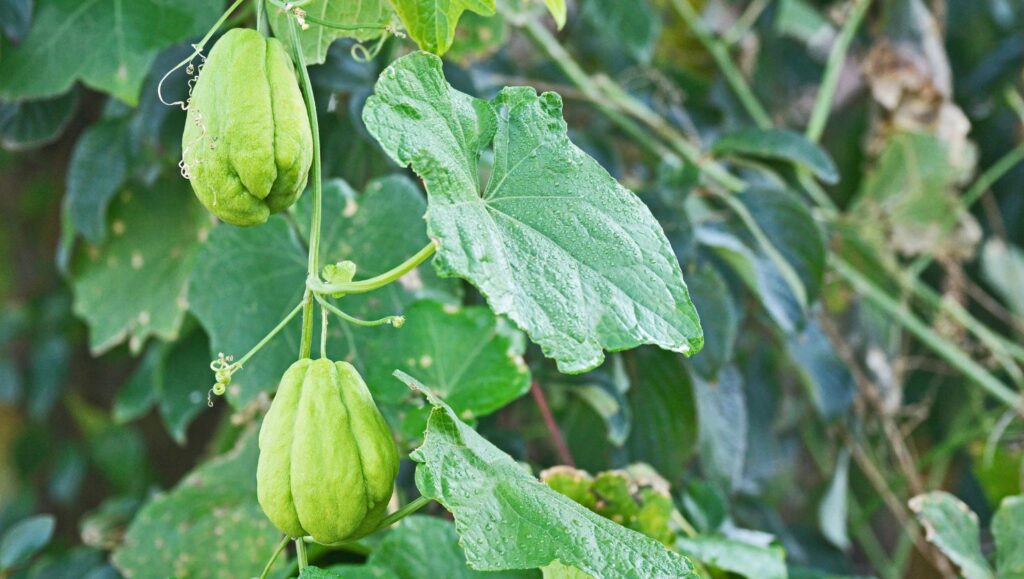
Optimal Growing Conditions for Choko to Flourish
- Sunlight: Thrives best in full sun to partial shade, adapting well to various light conditions, thus versatile for different garden designs.
- Soil: Requires well-drained, compost-enriched soil that promotes healthy root development and supports vigorous growth.
- Watering: Needs regular watering during dry months to keep the plants hydrated and thriving.
- Fertilizing: Benefits from organic compost and seaweed-based fertilisers to enhance growth, ensuring robust plant health.
- Pruning: Regular trimming is necessary to control growth and maintain a desired shape, contributing to the aesthetic appeal of your garden.
Expert Tips for Successfully Growing Choko on a Pergola
- Choko vines tend to spread quickly, so be prepared for frequent pruning to maintain control and prevent overcrowding.
- Fruits grow on long tendrils, making them easy to spot and harvest when ripe, contributing to their appeal.
- This vine can tolerate drier conditions, making it a suitable choice for Brisbane’s climate, enhancing its practicality for local gardeners.
Understanding the Crucial Differences: Moth Plant vs. Choko
Many gardeners in Brisbane cultivate choko (Sechium edule) as an easy-to-manage vine for edible fruit and rapid pergola coverage. However, some may mistakenly grow the moth plant (Araujia sericifera), which is a toxic, fast-spreading vine native to South America and classified as an invasive weed in Queensland. This plant was initially introduced as an ornamental, but it has since become a significant pest, smothering native vegetation and spreading aggressively across the landscape, threatening local ecosystems.
If you’re growing choko or other climbing vines, it is essential to learn how to identify and eradicate moth plants before they proliferate and pose a danger to your garden and local ecosystems. Awareness and proactive management are crucial to maintaining a healthy garden environment.
5. Dragon Fruit (Hylocereus spp.) – An Exotic Climbing Cactus for Unique Edible Landscapes
Best for: Unique edible landscapes and gardens designed for low water usage.
Dragon fruit is a cactus vine known for its strikingly vibrant pink or yellow fruit filled with sweet, refreshing flesh. This plant exhibits remarkable drought tolerance, making it an excellent choice for low-maintenance gardens that thrive in Brisbane's climate. Its distinct appearance and exotic flavour make it a fascinating addition to any garden.
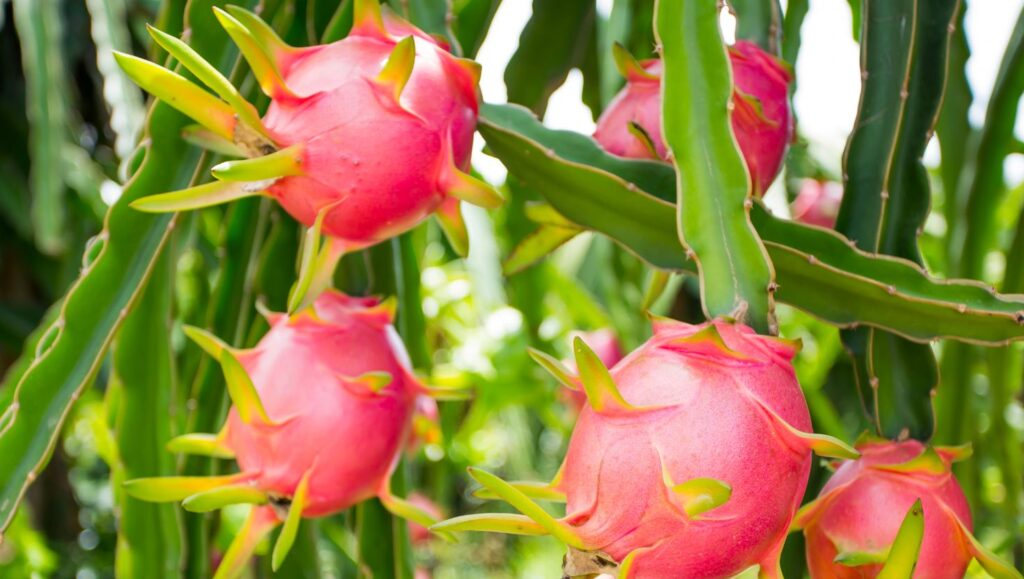
Optimal Growing Conditions for Cultivating Dragon Fruit Successfully
- Sunlight: Requires full sun to thrive, ensuring it receives ample light for healthy growth and fruit production, which is crucial for a good yield.
- Soil: Thrives in well-drained, sandy soil that is enriched with organic matter to support root health and promote vigorous growth.
- Watering: Minimal; requires deep watering only during dry months, making it very low-maintenance and suitable for water-conscious gardeners.
- Fertilizing: Light applications of organic fertiliser are recommended every 2 months to promote growth and enhance fruit quality.
- Pruning: Regularly check growth to keep it in check and encourage upward climbing, which helps maintain a tidy appearance.
Best Dragon Fruit Varieties to Cultivate
- White-fleshed dragon fruit – Offers a mild, sweet flavour, perfect for fresh eating and adding to fruit salads.
- Red-fleshed dragon fruit – Known for its intense sweetness and high antioxidant content, making it a favourite among health-conscious individuals.
- Yellow dragon fruit – Smaller in size but exceptionally sweet, adding diversity to your garden and culinary options.
Best Practices for Growing Dragon Fruit on a Pergola
- Provide a sturdy trellis or pergola support, as dragon fruit can become quite heavy and requires stability to thrive.
- Be aware that flowers bloom at night and are typically pollinated by bats or moths, so timing is crucial for successful fruiting.
- Consider hand pollination to increase fruit yield, especially in areas with fewer natural pollinators, ensuring a bountiful harvest.
Choosing the Ideal Fruiting Vine for Your Pergola
Each fruiting vine presents unique growth habits, weight requirements, and pruning needs. For instance, passionfruit is ideal for rapid coverage, while kiwi and grapes require sturdier pergolas to support their growth. Meanwhile, dragon fruit offers a unique edible option with minimal water needs, perfect for those looking to create a low-maintenance garden that still yields delicious fruits.
Are you ready to design the perfect pergola to support your fruiting vines?
Contact Pergolas Brisbane at (07) 3064 0661 for expert advice on custom pergola design and installation tailored to your garden's unique needs, allowing you to create a stunning outdoor space that meets your desires.
Best Fruiting Vines for a Pergola in Brisbane – Passionfruit, Kiwi & More
The Article: Fruiting Vines for Brisbane Pergolas: Passionfruit, Kiwi & More first appeared on https://writebuff.com
The Article Fruiting Vines for Brisbane Pergolas: Passionfruit, Kiwi & More Was Found On https://limitsofstrategy.com


It’s fascinating how the integration of fruiting vines into pergola designs not only enhances the physical appearance of outdoor spaces but also addresses the desire for sustainable living. In Brisbane’s subtropical climate, you’re right to highlight the variety of options available. I’ve personally enjoyed growing passionfruit on my pergola, which not only provides a beautiful cascade of greenery but also yields an abundance of fruit throughout the warmer months.
It’s great to hear about your experience with passionfruit on your pergola. They really do create such a stunning visual while rewarding you with delicious fruit. Growing your own food not only provides a fresh harvest but also connects you to the seasonal rhythms of nature, which is fantastic for anyone looking to embrace a more sustainable lifestyle.
Growing passionfruit on your pergola sounds like a rewarding experience. The balance between aesthetics and practicality is key when thinking about outdoor spaces, especially in a climate like Brisbane’s, where the interplay of sun and shade can really transform an area.